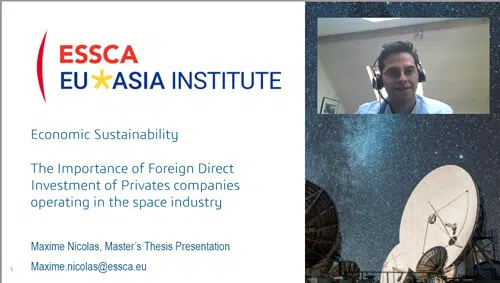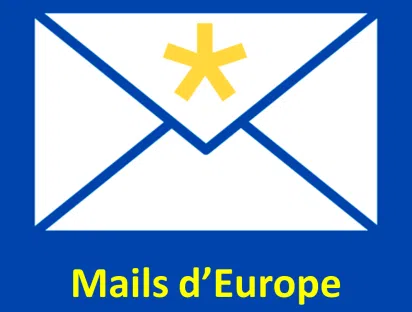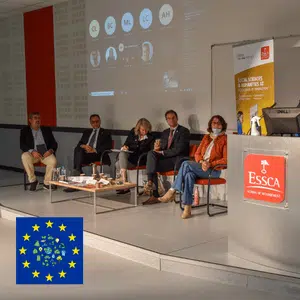The standing European Space Policy Group held its 12th workshop on “Space and Sustainability”, featuring the Master’s theses of two ESSCA students. EU*Asia Institute’s research assistant Jeanne-Gérard Wague took the opportunity to ask Maxime NICOLAS a few questions about his paper “The Importance of Foreign Direct Investment of private companies operating in Space Industry”.

Jeanne-Gérard Wague: Why did you choose the space industry?
Maxime NICOLAS: I am passionate about aeronautics and aerospace and have studied both subjects with my mentor. I found more information on the aerospace, military and commercial fields, and I focused on the industrial and commercial aspect for ease of access to additional information.
Jeanne-Gérard Wague: During your presentation, you presented the space industry as a niche. Is it because it is not yet exploited or is there another reason?
Maxime NICOLAS: During the presentation I clarified that there are sometimes niche collaborations, two companies will collaborate on the same project, but the space industry is no longer necessarily a niche industry because it is represented in several States already. One example is the race to conquer space between Russia and the United States of America. So, I would say that the space industry is not a niche industry but an industry on the cutting edge of technology and competitive at the State level.
Jeanne-Gérard Wague: Recently, following the choice of SpaceX as the manufacturer of the landing module, Blue Origin filed a protest with the Government Accountability Office against NASA, saying that their decision eliminates competitive opportunities. Despite the benefits of the space industry for investors, that you have presented, don’t you think that some companies might feel they are in an “unfair” market when such decisions are made?
Maxime NICOLAS: During my research and in my work, I have focused on the European sector. I don’t think I can discuss American management. As far as I know, when ESA initiates projects, it issues a call for tenders. Plenty of companies apply and based on criteria such as competence and geographical return, ESA chooses a first company. That company is called “Prime” and oversees the project. The Prime company, together with ESA, then chooses other companies, so-called “Tiers” to help it carry out the project. It may happen that some companies think they are in an unfair situation, believing that they have the necessary skills to lead the project, but here it is, ESA first and foremost chooses the company that presents all the requirements.
Jeanne-Gérard Wague: Can the FDI of private companies operating in the space industry lower the comparative advantage the space industry confers on a nation/union?
Maxime NICOLAS: ESA selects a company for its skills, the FDI system comes next. Indeed, it is the lead company that develops its FDI strategy after it has been selected. FDI does not diminish the advantages a country might have; the public space agency relies on the capabilities of private companies and not its investment strategy. So no, in the case of the space industry projects initiated in Europe, I don’t think that FDI from private companies diminishes the comparative advantage of a nation.
Jeanne-Gérard Wague: Is your presentation suitable for all types of countries? Are the advantages and disadvantages of FDI by private companies operating in the space industry the same worldwide?
Maxime NICOLAS: Regarding the European member countries of ESA, yes, the presentation suits all of them. But worldwide this may not be the case. And that because each country represents different comparative advantages based on its own factors.
Jeanne-Gérard Wague: How can investment in the space industry be stimulated?
Maxime NICOLAS: It’s like economic investment. ESA will create projects over several years and launch calls for tenders. The choice of a company and its collaboration with several others will give rise to investments. The money for this investment comes from the states. ESA has capital and when it comes to choosing the company that best responds, ESA will favor the company with the necessary skills but also whose country has made a strong monetary contribution. This is the model of geographic return, return on investment. So, I would say that stimulating space investment goes through the creation of projects.
For the interview with Laurène Laffin on the presentation of her Master’s thesis: “5G for a European Political Sustainability”, click here.




